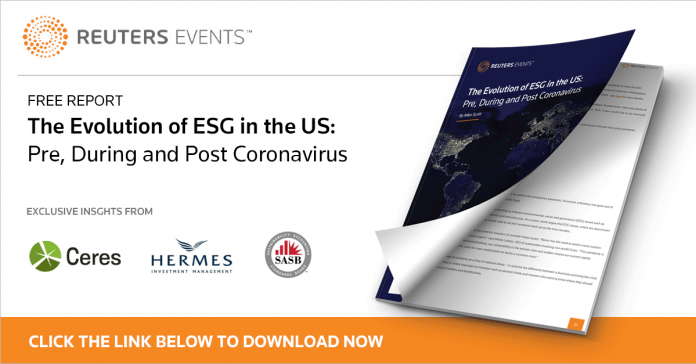Just as investors are getting to grips with the importance of environmental, social and governance issues (ESG) to their investment strategies, economic orthodoxy has gone out of the window as the world fights to control the coronavirus pandemic.
Some say that this means ESG issues, such as climate change, human rights in supply chains, diversity and executive pay, will slip back down the agenda as governments focus on resurrecting their economies. But others say that the pandemic and its knock-on effects reinforce the need for investors to consider these issues.
“Never has the need to build a more sustainable, inclusive economy been clearer or more urgent,” says Mindy Lubber, CEO of sustainable investing non-profit Ceres. “This pandemic is a painful reminder of our universal interconnectedness, our vulnerability to the seismic risks and sudden shocks our current capital markets systems expose us to, and the need for mass mobilization to tackle a common crisis.”
And there is growing evidence that companies with good performance on ESG are faring better in the face of the extreme economic shock and they are more resilient not just to this shock but to other disruptions such as the ongoing climate emergency. Bloomberg and MSCI say that ESG indexes and funds have outperformed their benchmarks.
Investors seem unlikely to abandon their interest in ESG, not least because the pandemic is the latest ESG issue to make its presence felt on financial markets and the wider economy. The impact of ESG issues is increasingly easy to see as more and better data becomes available and technologies such as artificial intelligence and machine learning help to analyse it.
Both individual investors such as Blackrock and coalitions such as Climate Action 100+ have targeted companies in order to get them to take ESG issues seriously.
Nigel Green, CEO of $12bn financial advisory group De Vere, says that “the coronavirus pandemic will trigger a ‘skyward surge’ in sustainable, responsible and impactful investing over the next 12 months for three key reasons. First, before the pandemic, research has revealed that investments that score well in terms of ESG credentials often outperform the market and have lower volatility over the long-run. Since the Covid-19 public health emergency up-ended the world, the latest broad analysis shows that ESG funds have typically continued to outperform others.”
“Second, the coronavirus pandemic has underscored the vulnerability and fragility of societies and the planet. It has underscored that increasingly companies will only survive and thrive if they operate with a nod from the wider court of public approval.
Green adds that “demographic shifts will support the trend. Millennials cite ESG investing as their top priority when considering investment opportunities. This is crucial because the biggest-ever generational transfer of wealth – likely to be around $30trn – from baby boomers to millennials will take place in the next few years. ESG investing was already going to reshape the investment landscape in this new decade – but the coronavirus will quicken the pace of this reshaping.”
This whitepaper was made in association with the upcoming ESG Investment Summit North America, an event by Reuters Events. For more information, please visit the website or get in touch with a member of the team.
Contact:
Dominic Grocott Head of ESG Investment – Reuters Events
+44 7535656597
[email protected]





























![“Does Everyone Hear Me OK?”: How to Lead Virtual Teams Effectively iStock-1438575049 (1) [Converted]](https://www.europeanbusinessreview.com/wp-content/uploads/2024/11/iStock-1438575049-1-Converted-100x70.jpg)




